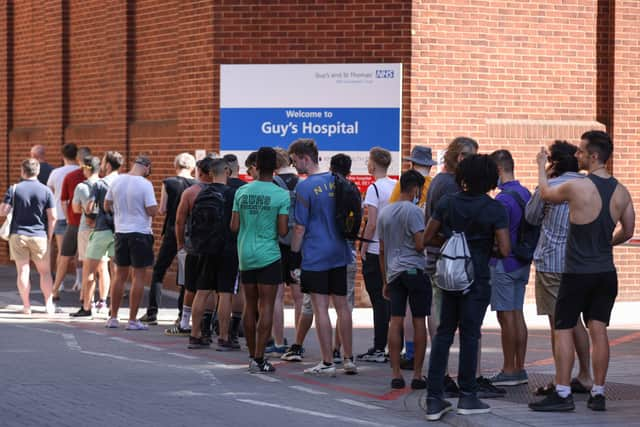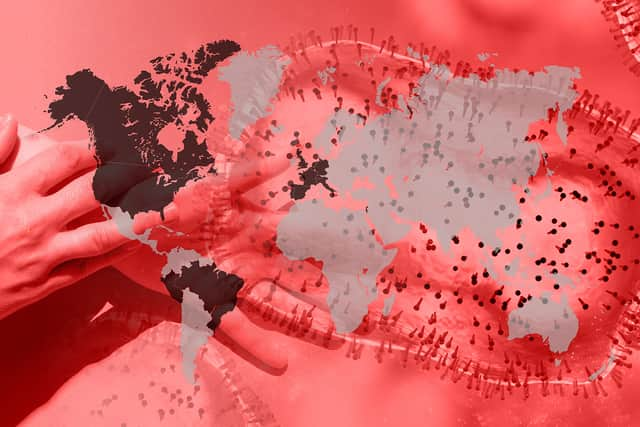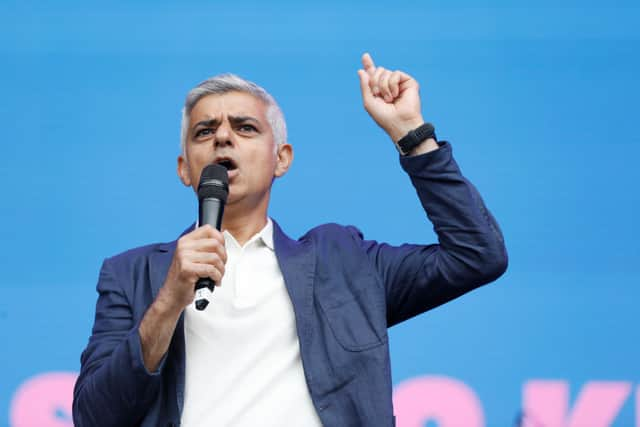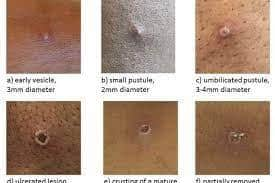Monkeypox: Where to get a vaccine near me in London and who can get vaccinated?
and live on Freeview channel 276
The NHS is to step up its monkeypox vaccination programme in London, as more supplies of the jab are available.
This comes as the World Health Organisation (WHO) has declared the monkeypox outbreak - with the UK’s epicentre in London - a “global emergency”.
Advertisement
Hide AdAdvertisement
Hide AdThe smallpox vaccine is being used to inoculate against monkeypox, as the viruses are similar.
Last week, health officials said 100,000 more doses had been bought, with the first 20,000 set to be delivered for use by the NHS in August.
London is to receive additional doses of the existing supply of the vaccine in an effort to break chain of transmission as quickly as possible, officials said.
In the latest data to July 25, 2,325 cases of the infection have been confirmed in England, with 73% - 1,699 - cases in the capital.


Where can I get a monkeypox vaccine near me in London?
Advertisement
Hide AdAdvertisement
Hide AdIn London, there are more than 18 clinics offering vaccinations. These include:
- Dean Street sexual health clinic: 56 Dean Street, London, W1D 6AE
- Chelsea and Westminster Hospital: 369 Fulham Rd, Chelsea, SW10 9NH
- Guy’s Hospital in Southwark: Great Maze Pond, Southwark, SE1 9RT
- Mortimer Market Centre in Camden: Capper Street, London, WC1E 6JB
- Barking Hospital Outpatient Centre East: Upney Lane, Barking, IG11 9LX
- Homerton sexual health services: Homerton Row, London, E9 6SR
Who can get vaccinated against monkeypox?
While anyone can get monkeypox, the majority of cases in the UK continue to be in gay, bisexual and other men who have sex with men.
Therefore the NHS is prioritising individuals who are most likely to get the virus.
People who are eligible for the vaccine are:
- Healthcare workers who are caring for and who are due to start caring for a patient with confirmed monkeypox.
- Gay, bisexual and other men who have sex with men at highest risk of exposure. Your doctor or nurse will advise vaccination for you if they consider you are at high risk.
- People who have already had close contact with a patient with confirmed monkeypox.
Thousands more people who are eligible in the capital will be contacted over the next few days and weeks about getting their jab, as plans are scaled up and more supply becomes available.
Advertisement
Hide AdAdvertisement
Hide AdThe public is being asked to wait to be contacted, with officials urging those who are invited to come forward at the earliest possible opportunity.
Some sexual health services will contact men who are likely to be at higher risk first, while other services will offer vaccines alongside other appointments, such as HIV PrEP.


What are sexual health campaigners saying?
The Terrence Higgins Trust has urged the NHS and the UK Health Security Agency (UKHSA) to urgently pump cash into the system to pay more healthcare workers to administer vaccines.
It also wants the number of doses ordered to be doubled to protect against a virus.
Advertisement
Hide AdAdvertisement
Hide Ad“There needs to be a [monkeypox] tsar charged with stopping this becoming endemic,” said Richard Angell, the campaigns director at the Terrence Higgins Trust.
“We can’t accept that it gets into the system like chlamydia.”
The British Association for Sexual Health and HIV has estimated that at least 125,000 people will need vaccines, including gay men living with HIV, sex workers, and staff in sexual health clinics and saunas.
What is the NHS saying?
Steve Russell, NHS Director of Vaccinations, said: “The NHS is now scaling up its plans to get people vaccinated, particularly in London, thanks to the efforts of staff who are working hard to help stop onward spread, in line with UKHSA advice.
Advertisement
Hide AdAdvertisement
Hide Ad“Thousands more people will be invited very shortly with the number of clinics expanded too, and as we have done with the most successful Covid vaccination programme in history, the NHS will leave no stone unturned in ensuring everyone who is eligible can get protected.
“We will be inviting anyone who we believe is a priority for vaccination and local teams will be working to make sure that anyone who meets the criteria set by UKHSA knows how they can get their jab.
“We are asking people to wait to be contacted and to come forward at the earliest opportunity possible when invited to get vaccinated.”


What is the government saying?
Vaccines minister Maggie Throup said: “While we know that monkeypox is usually mild and does not spread easily between people, we have procured more vaccines to further help control the outbreak.
Advertisement
Hide AdAdvertisement
Hide Ad“It is vital people continue to stay alert and contact a sexual health clinic if they notice any unusual rashes or lesions.
“The NHS is already contacting those eligible for the vaccine, and I would urge people to take up the offer as soon as they are contacted.
“I’m extremely grateful to the fantastic teams working across the capital to keep everyone safe.”
What is the Mayor of London saying?
The mayor of London, Sadiq Khan said that we should all be worried about monkeypox.
Advertisement
Hide AdAdvertisement
Hide Ad“We’ve been lobbying the government to not just make sure there’s better public health advice, but also roll out more vaccines,” he told LondonWorld.
“There are certain people who are more prone to catch this virus.
“I would encourage anyone invited to receive a vaccine to take it up.
“It’s really important that we don’t sleepwalk into this as I’m afraid we did with the government’s inaction with Covid.”


What are the symptoms of monkeypox?
Advertisement
Hide AdAdvertisement
Hide AdAccording to the NHS’s website, the symptoms of monkeypox are:
- a high temperature
- a headache
- muscle aches
- backache
- swollen glands
- shivering (chills)
- exhaustion
A rash usually appears 1 to 5 days after the first symptoms. The rash often begins on the face, then spreads to other parts of the body. This can include the genitals and anus.
It starts as raised spots, which turn into small blisters filled with fluid. These blisters eventually form scabs which later fall off.
The symptoms usually clear up in a few weeks. While you have symptoms, you can pass monkeypox on to other people.
What should you do if you come into contact with monkeypox?
Advertisement
Hide AdAdvertisement
Hide AdUKHSA guidance for close contacts of a confirmed monkeypox case has been updated. This means close contacts won’t need to isolate at home if they don’t have symptoms.
The change is being implemented in response to latest data showing that a relatively small number of close contacts have gone on to develop monkeypox and a lack of evidence of transmission outside of close intimate or sexual contact, now that more epidemiological information is available. It means the latest guidance is proportionate to the latest transmission risks identified and is in line with advice from the WHO, other European countries and the CDC.
For category 2 and category 3 close contacts it is recomended people should:
- contact NHS 111 or a sexual health clinic if they develop a fever or any of the other symptoms described below
- avoid skin to skin contact with others, such as hugging and kissing
- refrain from sexual or intimate contact
- avoid international travel if possible; travel insurance may also not be valid for people advised not to travel
- let health or dental facility staff know they’re a close contact before attending for health or dental care
For category 3 close contacts:
- we recommend avoiding close contact with children aged under five years, pregnant women and those who have an impaired immune system
- if they work with children aged under five years, pregnant women or those who have an impaired immune system, UKHSA or their employer might inform them if they need to take time off – this decision will be based on a personalised clinical assessment
Comment Guidelines
National World encourages reader discussion on our stories. User feedback, insights and back-and-forth exchanges add a rich layer of context to reporting. Please review our Community Guidelines before commenting.
